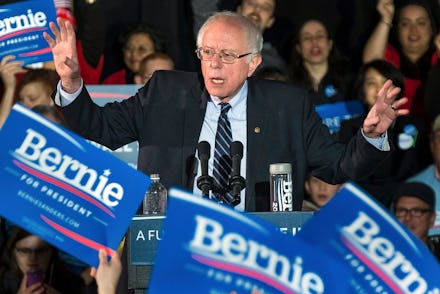A Year Ago, Bernie Sanders Was Losing to Hillary Clinton by 61% in Iowa. Tonight They Tied

As of midnight on Monday night, Sen. Bernie Sanders trails Hillary Clinton in the Iowa caucuses by less than a percentage point. Clinton's campaign has chosen to paint the narrow margin between them as grounds for victory, while Sanders' described them as in a "virtual tie."
But that final result may not be the best way to measure Sander's performance in the Hawkeye State. While Sanders' was not able to give his outsider campaign the kind of boost that then-Sen. Barack Obama was able to by winning a decisive victory in Iowa in 2008, the fact that he has basically split Iowa with Clinton is pretty remarkable given how far outside the mainstream he has resolutely stood for his entire political career.
Sanders highlighted this unlikely trajectory in his Monday night speech.
"Nine months ago we came to this beautiful state," Sanders said. "We had no political organization, we had no money, we had no name recognition and we were taking on the most powerful political organization in the United States of America."
A year ago, Clinton's support in Iowa stood at 68%, while Sanders was a mere 7%. Clinton, a member of a beloved American dynasty, was widely perceived by political pundits as one of the most dominant non-incumbent candidates in modern political history.
Beyond those discouraging numbers, most political analysts were convinced that as voters learned more about Sanders, they'd be even less inclined to support him. After all, he openly identified as a democratic socialist, he declared war on the financial sector, and he considered Scandinavia to provide the model for an ideal society. Conventional wisdom dictated that Sanders would enjoy a brief bit of attention as a protest candidate, and then he would fade back into obscurity.
But Sanders has emerged as a real challenger. Now virtually tying with Clinton in terms of votes in Iowa, and with very strong odds of winning in New Hampshire, his longshot campaign has become a real force.
Beyond New Hampshire, it's difficult to anticipate how the race will proceed, but already it's clear — Sanders has cleared hurdles once thought impossible.